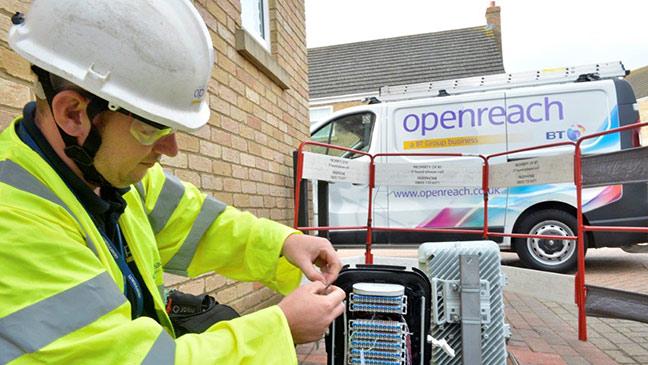Ofcom to force Openreach to cut price for 40Mbps internet
 UK telecom regulator Ofcom has said that it will cut wholesale prices charged by BT infrastructure arm Openreach for ultra-fast broadband access to safeguard consumers from high prices and stimulate uptake.
UK telecom regulator Ofcom has said that it will cut wholesale prices charged by BT infrastructure arm Openreach for ultra-fast broadband access to safeguard consumers from high prices and stimulate uptake.
Ofcom said it would cut the wholesale price that Openreach – the part of BT responsible for its network – can charge telecoms companies for its popular superfast broadband service, which has a download speed of up to 40Mbps, as part of a series of measures to encourage investment in fibre and promote competition.
Ofcom said it would also maintain its existing policy of pricing flexibility for Openreach’s fastest broadband products, including those based on BT’s own network investments in full-fibre and its new G.Fast technology.
Ofcom said it expected saving to passed on to consumers in the shape of lower prices.
Opentreach will also be mandated to repaor faults and install new lines more quickly, a source of complaint to rival provides such as Sky.
Ofcom said its analysis showed that the most important high-speed package will be one offering a 40Mbps download speed and 10Mbps upstream. With demand for faster services leading consumers to turn away from low-cost, low-bandwidth alternative providers, Ofcom said it would force Openreach to reduce its charges for this package from £88.80 per year to £52.77 in 2020-21.
Ofcom said it would not cap Openreach’s wholesale charges for its higher-speed packages including its planned new G.Fast network.
In terms of repairs, Openreach will be required to complete 93% of fault repairs within one to two working days of being notified, compared with 80% today, and complete 97% of repairs no later than six or seven working days.
It will also have to provide an appointment for 90% of new line installations within 10 working days of being notified, compared to 80% within 12 days currently; and install 95% of connections on the date agreed between Openreach and the telecoms provider, up from 90% today.
The measures are part of Ofcom’s Wholesale Local Access Market Review for 2018-21. The consultations close on June 9, and the regulator expects to publish its final decisions in early 2018, with new rules taking effect on April 1 2018.
Ofcom will also consult soon on detailed plans to open up BT’s network of telegraph poles and underground tunnels to competitors.
“Our plans are designed to encourage long-term investment in future ultrafast, full-fibre networks, while promoting competition and protecting consumers from high prices.People need reliable phone and broadband services more than ever. We’re making sure the market is delivering the best possible services for homes and business across the UK,” said Jonathan Oxley, Ofcom’s competition group director.
“The announcement represents the latest challenge to an increasingly under-fire BT, which remains on the back-foot from an accounting scandal in Italy and Ofcom’s efforts to create a legally separate Openreach,” said Kester Mann, Principal Analyst, Operators at CCS Insight, commenting on the announcement.
“It also again reinforces the regulator’s determination to maintain a competitive UK retail broadband market and stimulate further investment. The news is likely to be welcomed by Openreach customers such as Sky, which have long campaigned for better access and end consumers, which could see a reduction in their bills. Tougher new targets for Openreach to fix faults and more quickly install new lines indicate that BT remains firmly on Ofcom’s radar. The threat of a full structural separation remains if BT cannot improve performance.”
Dan Howdle, consumer telecoms analyst at broadband advice site Cable.co.uk, highlighted the lack of a cap on higher-speed services.
“By placing no such cap on prices charged for ultrafast – variously defined as speeds exceeding 100, 300 or 1000 megabits per second, depending on who you ask – investment in these faster technologies will be positively encouraged. Ultrafast will thereby take on the role of premium service – a spot currently occupied by standard fibre, and by that token become the (somewhat more expensive) option for consumers who wish to be at the cutting edge,” he said.



